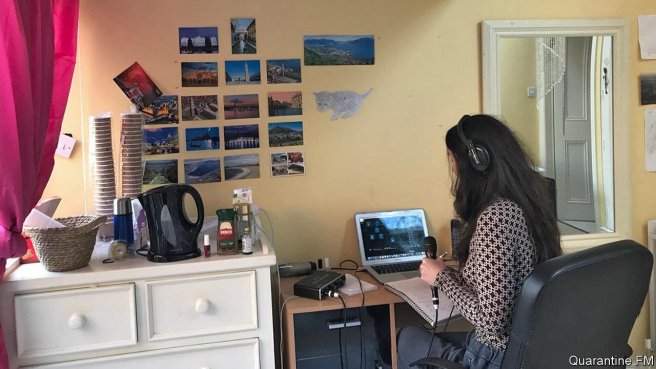This feature was originally published by The Economist.

April 17, 2020
MILLIONS OF PEOPLE in lockdown are finding diversion at the flick of a dial. According to Radiocentre, the industry body for commercial radio in Britain, local and national stations reported increases in daily listeners of between 15% and 75% in the second half of March. They’ve got competition. Radio stations offering information, entertainment and reassurance to listeners isolated at home have sprung up from Ireland to Syria, Italy to India. Informal and interactive, many are run by amateurs from their homes, with producers learning the ropes as they go.
In Italy Radio Zona Rossa (Radio Red Zone) began broadcasting from the town of Codogno, the site of the country’s first locally transmitted coronavirus infection, just days after Lombardy went into lockdown on February 21st. Hosted by Pino Pagani, an octogenarian whose co-presenter and friend was killed by the virus in March, the twice-daily programme uses the registered FM frequencies of a local station, Radio Codogno, to provide updates on the spread of the virus and the opening hours of local essential services. Mr Pagani also interviews experts and invites residents to call in for a chat.
Radio Zona Rossa is an exception, as most of the new stations are digital and can be heard around the world. In Beirut, Radio al-Hai (The Neighbourhood’s Radio) was launched on March 13th, two days before Lebanon imposed social-distancing measures. Run by seven friends, all broadcasting live from their own homes, the station offers an eclectic mix of local music, poetry readings, storytelling and specialist programmes, including an economist’s predictions on the global ramifications of the pandemic. Radio al-Hai also gives live slots to anyone who wants to contribute, creating a sense of community among listeners starved of human contact.
“It’s like a virtual hug,” says Majd Al-Shihabi, a Palestinian-Syrian systems-design engineer based in Beirut. He founded the station with the help of friends in Milan who have created their own quarantine radio station using Radiojar, an online audio platform. “We want to be together experiencing the same thing at the same time, which is what gathering in a public space would [provide],” Mr Al-Shihabi says. “The radio is kind of like a public space.” The success of Radio al-Hai, which attracted 13,000 visitors in its first month on air, has encouraged others to establish sister stations in Germany, Palestine, Syria and Tunisia, hosted on the same platform but run by independent teams.
In India, Radio Quarantine Kolkata was launched on March 25th, the day the country went into lockdown. Run by a group of professors, PhD students and film-makers, it broadcasts daily from 5pm until 2am with a programme that includes a children’s show and discussions on topics such as exile and migrant labour. It finishes each night with a popular segment called “Songs of comfort for hypochondriacs and panicking lovers”, hosted by Sudipto Sanyal, a writer, who plays an eclectic mix of Indian and international songs. The Radio Quarantine was launched a day later in Bengaluru. Run by a group of composers and instrument builders, it features reflections on India’s political and social challenges and broadcasts music every night based on themes such as “isolation” and “dancing on your own”. Listeners are encouraged to submit requests.
In Dublin, Quarantine FM (pictured) was founded by Anne-Rose Charleton, a Dublin-based screenwriter, film producer and radio DJ, and Kate McKeown, an Irish actress, after both women had their work commitments cancelled. The digital station operates every weekday from 9am to 9pm, broadcasting a daily schedule of pre-recorded and live shows, including slots aimed at children and university students, a mindfulness hour focused on mental health, several programmes dedicated to Irish music and the Passion Project, which features interviews with actors, artists and musicians.
“The whole idea was just to cheer people up. We were so sick of listening to bad news,” says Ms McKeown. She and Ms Charleton set up the station in just six days, launching it the week before Ireland closed down. It has proved unexpectedly popular, attracting thousands of listeners and submissions from Irish musicians keen to broadcast their music, as well as podcasters whose work has been derailed. “There’s something nice about the fact that you’re all in it together,” she says. “We don’t just want famous names…we really wanted to hear the everyday stories.”
The sudden birth of these stations suggests that radio is particularly suited to offsetting the tedium and loneliness of lockdown, with live radio in particular offering an opportunity for connection and recognition. For those braving weeks of lockdown alone, the timbre of a familiar voice offers reassurance and companionship. For those isolating with friends or family, a headset and a livestream may provide a welcome means of escape.
I hope these Radio Stations are on the FM Band, and are not on the newfangled Internet-based Audio Streaming.
I love conventional Broadcast AM and FM Radio, as well as Ham Radio.
I do not care for the newfangled, Internet-based Audio Streaming and Podcasts.
LikeLike